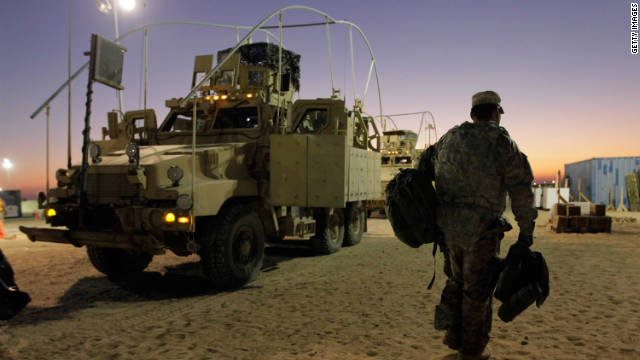 Last night I worked late at the office. My co-workers and I had a long discussion about the ongoing Iraq situation and what we should do regarding our troops.
Last night I worked late at the office. My co-workers and I had a long discussion about the ongoing Iraq situation and what we should do regarding our troops.I believe we should drawdown our troops. It is time.
So I thought I would share an opinon or two.
Of course critics of the U.S. drawdown in Iraq claim that we are foregoing hard-won gains - years of blood, toil and tears - by getting out now. This is what Liz Cheney said on Fox the other day. I disagree. Let’s review the gains of the Iraq War: You have an Iraq that is not ruled by a brutal, tyrannical dictator, Saddam Hussein; you have some kind of democracy in Iraq; and the Kurds have been given an even greater measure of autonomy.
These are all important developments but they are not core security gains for the United States. And they are not really threatened by our leaving.
The original goals of the Iraq War were to rid Iraq of weapons of mass destruction and to change the dynamics of the Middle East. We now know that WMDs did not exist. Historians will debate whether the Iraq War changed the dynamics of the Middle East more broadly. I think it did have an impact but it was part of a broader trend after 9/11 when America began reducing its support for dictators like Mubarak. Those moves were probably more important than Iraq.
Moving forward we can be sure that no matter what happens in Iraq, the future of Morocco, Egypt and Tunisia will be determined by none other than the Moroccans, Egyptians and Tunisians. If Iraqi Prime Minister Nouri al-Maliki becomes more dictatorial, does anyone really think that will affect what’s happening in Egypt?
Another great concern with the drawdown is that Iraq will become a pawn of Iran. This is not an insignificant concern. But if the worry is Iranian influence, the time to have addressed it was when we invaded Iraq in the first place. The United States empowered Shia exiles that had spent nearly a decade in Iran. The Bush Administration made significant mistakes in allowing too much Iranian influence in Iraq, all while professing to be highly anti-Iranian. I don’t think it was intentional; it was just one in a series of blunders the Bush Administration made in Iraq.
Nevertheless, I don’t think Iraq will become a pawn of Iran in the wake of the American drawdown. National interest always drives foreign policy and Iraq has its own sense of nationalism. In the Iraqi imagination, Iran is not a friendly big brother. Iran is the country against which Iraq fought an eight-year war. Iraq lost hundreds of thousands of people in that war. A foreign policy seen as ceding Iraqi interests to Iran today would not be very popular among Iraqis.
So the question becomes whether this drawdown is too fast and too complete. Would it have been better if a few thousand American troops stayed behind? Possibly. But that proved difficult for domestic political reasons within Iraq. And it misses the larger point, which is that the drawdown is actually very beneficial for American foreign policy.
The U.S. needs to transition to a foreign policy in which its core interests can be preserved without occupying vast swathes of land and nation building in difficult societies. America’s foreign policy must take advantage of the fact that it is a distant power with a flexible, high-tech military. America should focus on protecting itself through targeted counterterrorism measures. It should leverage the flexibility and political space that it gains by notbeing an occupying force. This will make the U.S. far stronger and safer in the long run than sitting in Iraq trying to control more real estate.
